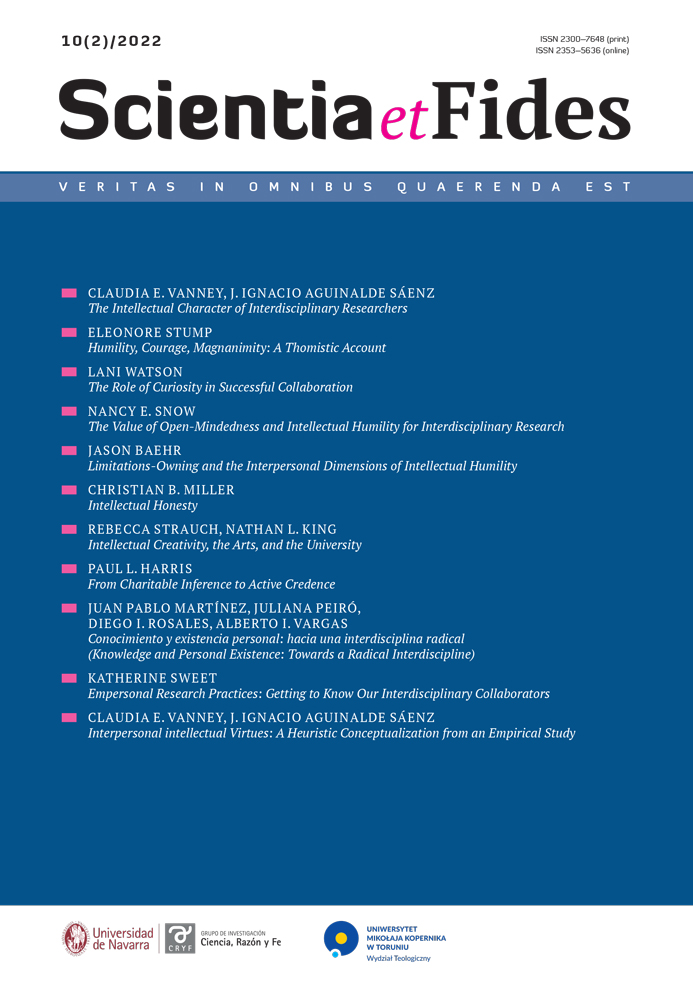Intellectual Creativity, the Arts, and the University
DOI:
https://doi.org/10.12775/SetF.2022.022Keywords
intellectual virtues, creativity, acquaintance, education, universityAbstract
As virtues of intellectual character are commonly discussed, they aim at propositional intellectual goods. But some creative works—especially those in music and the visual arts—are not primarily intended to gain, keep, or share propositional goods such as truth, knowledge, and understanding. They aim at something else. Thus, to conceive of intellectual creativity in a way that accords with standard discussions of intellectual virtue is to exclude paradigmatic works of the creative intellect. There is a kind of puzzle here: it appears that we cannot maintain both the commonly-discussed notion of intellectual virtue and the claim that, say, Beethoven’s Ninth, or Monet’s Water Lilies, are central cases of intellectually virtuous creativity. We provide a two-part solution to the puzzle. First, we suggest that some works of music and visual art can convey propositional goods. Second, we appeal to the notion of acquaintance as an epistemic good that is conveyed through creative artistic and musical to an extent not conveyed in standard prose works. In this respect, intellectual creativity is the virtue that breaks the propositional mold of much contemporary virtue epistemology.
References
Baehr, Jason. 2018. “Intellectual Creativity.” In Creativity and Philosophy, edited by Berys Gaut and Matthew Kieran, 42–59. New York, Routledge Press.
Bonds, Mark Evan. 2014. Absolute Music: The History of an Idea. New York: Oxford University Press.
Cahill, Thomas. 1995. How the Irish Saved Civilization: The Untold Story of Ireland’s Heroic Role from the Fall of Rome to the Rise of Medieval Europe. New York: Anchor Books.
Dahlhaus, Carl. 1989a. The Idea of Absolute Music. Trans. Roger Lustig. Chicago: The University of Chicago Press.
Dahlhaus, Carl. 1989b. Nineteenth-Century Music. Trans. J. Bradford Robinson. Berkeley and Los Angeles: University of California Press.
Flexner, Eleanor. 1959. Century of Struggle: The Woman’s Rights Movement in the United States. Cambridge, MA: Belknap Press.
Fujimura, Makoto. 2020. Art and Faith: A Theology of Making. New Haven and London: Yale University Press.
Gaut, Berys. 2004. “Art and Knowledge.” In The Oxford Handbook of Aesthetics, edited by Jerrold Levinson, 436–450. New York: Oxford University Press.
Gaut, Berys. 2006. “Art and Cognition.” In Contemporary Debates in Aesthetics and the Philosophy of Art, edited by Matthew Kieran, 115–126. Malden, MA: Blackwell.
Gaut, Berys and Matthew Kieran. 2018. Eds., Creativity and Philosophy. New York: Routledge Press.
Gombrich, E.H. 2011. The Story of Art. New York: Phaidon Press.
Gribbin, John. 2004. The Scientists. New York: Random House.
Kant, Immanuel. 1999. Critique of Pure Reason. Ed. and trans. Paul Guyer and Allen Wood. New York: Cambridge University Press.
Kieran, Matthew. 2019. “Creativity as an Epistemic Virtue.” In The Routledge Handbook of Virtue Epistemology, edited by Heather Battaly, 167–77. New York: Routledge.
McGrew, Timothy. 2009. “Introduction to Part I.” In Philosophy of Science: An Historical Introduction, edited by Timothy McGrew, Mark Alspector-Kelly, and Fritz Allhoff, 5–11. Malden, MA: Wiley-Blackwell.
Munitz, Milton. 1981. Contemporary Analytic Philosophy. New York: Macmillan Publishing.
Roberts, Robert and Jay Wood. 2007. Intellectual Virtues: An Essay in Regulative Epistemology. Oxford: Oxford University Press.
Robinson, Charles S. 1876. Psalms & Hymns, & Spiritual Songs: A Manual of Worship for The Church of Christ. New York: A.S. Barnes and Company.
Seeger, Charles. 1924. “On the Principles of Musicology.” The Musical Quarterly 10/2: 244–250.
Seeger, Charles. 1925. “Prolegomena to Musicology: The Problem of the Musical Point of View and the Bias of Linguistic Presentation.” Eolus: A Review for New Music 4/2: 12–24.
Sharif, Malik. 2019. Speech About Music: Charles Seeger’s Meta-Musicology. Vienna: Hollitzer Verlag.
Smashing Pumpkins. 1995. “Bullet with Butterfly Wings.” Mellon Collie and the Infinite Sadness. New York: Virgin Records.
Taruskin, Richard. 2005. The Oxford History of Western Music, volume 2. New York: Oxford University Press.
Wittgenstein, Ludwig. 2006. Tractatus Logico-Philosophicus. Trans. D.F. Pears and B.F. McGuinness. New York: Routledge Press.
Zagzebski, Linda. 1996. Virtues of the Mind. New York: Cambridge University Press.
Downloads
Published
How to Cite
Issue
Section
License
Copyright (c) 2022 Nathan King, Rebecca Strauch

This work is licensed under a Creative Commons Attribution-NoDerivatives 4.0 International License.
CC BY ND 4.0. The Creator/Contributor is the Licensor, who grants the Licensee a non-exclusive license to use the Work on the fields indicated in the License Agreement.
- The Licensor grants the Licensee a non-exclusive license to use the Work/related rights item specified in § 1 within the following fields: a) recording of Work/related rights item; b) reproduction (multiplication) of Work/related rights item in print and digital technology (e-book, audiobook); c) placing the copies of the multiplied Work/related rights item on the market; d) entering the Work/related rights item to computer memory; e) distribution of the work in electronic version in the open access form on the basis of Creative Commons license (CC BY-ND 3.0) via the digital platform of the Nicolaus Copernicus University Press and file repository of the Nicolaus Copernicus University.
- Usage of the recorded Work by the Licensee within the above fields is not restricted by time, numbers or territory.
- The Licensor grants the license for the Work/related rights item to the Licensee free of charge and for an unspecified period of time.
FULL TEXT License Agreement
Stats
Number of views and downloads: 795
Number of citations: 0



